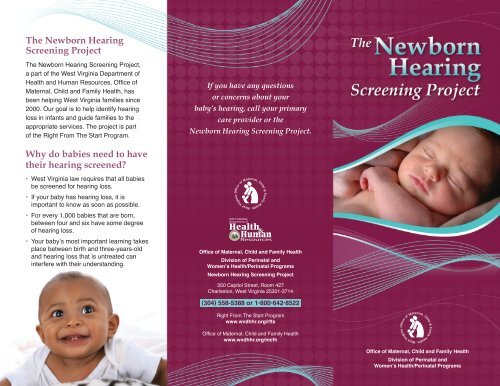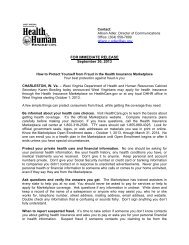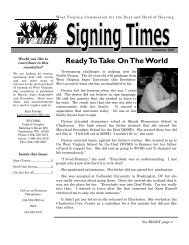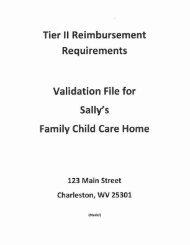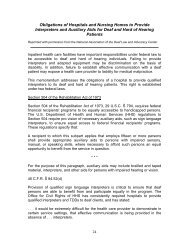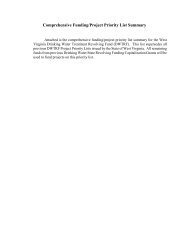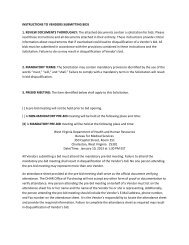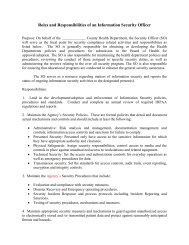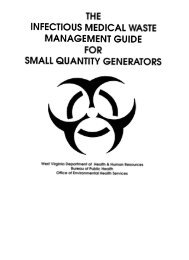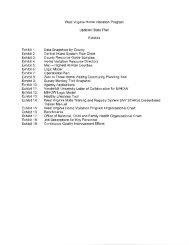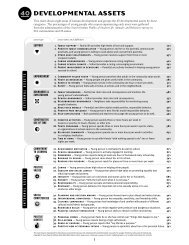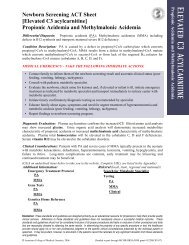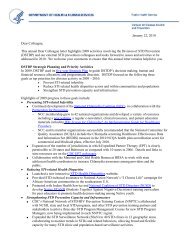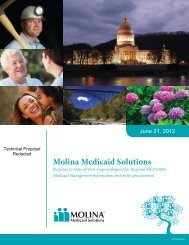Newborn Hearing Screening - West Virginia Department of Health ...
Newborn Hearing Screening - West Virginia Department of Health ...
Newborn Hearing Screening - West Virginia Department of Health ...
Create successful ePaper yourself
Turn your PDF publications into a flip-book with our unique Google optimized e-Paper software.
The <strong>Newborn</strong> <strong>Hearing</strong><br />
<strong>Screening</strong> Project<br />
The <strong>Newborn</strong> <strong>Hearing</strong> <strong>Screening</strong> Project,<br />
a part <strong>of</strong> the <strong>West</strong> <strong>Virginia</strong> <strong>Department</strong> <strong>of</strong><br />
<strong>Health</strong> and Human Resources, Office <strong>of</strong><br />
Maternal, Child and Family <strong>Health</strong>, has<br />
been helping <strong>West</strong> <strong>Virginia</strong> families since<br />
2000. Our goal is to help identify hearing<br />
loss in infants and guide families to the<br />
appropriate services. The project is part<br />
<strong>of</strong> the Right From The Start Program.<br />
If you have any questions<br />
or concerns about your<br />
baby’s hearing, call your primary<br />
care provider or the<br />
<strong>Newborn</strong> <strong>Hearing</strong> <strong>Screening</strong> Project.<br />
Why do babies need to have<br />
their hearing screened?<br />
• <strong>West</strong> <strong>Virginia</strong> law requires that all babies<br />
be screened for hearing loss.<br />
• If your baby has hearing loss, it is<br />
important to know as soon as possible.<br />
• For every 1,000 babies that are born,<br />
between four and six have some degree<br />
<strong>of</strong> hearing loss.<br />
• Your baby’s most important learning takes<br />
place between birth and three-years-old<br />
and hearing loss that is untreated can<br />
interfere with their understanding.<br />
Office <strong>of</strong> Maternal, Child and Family <strong>Health</strong><br />
Division <strong>of</strong> Perinatal and<br />
Women’s <strong>Health</strong>/Perinatal Programs<br />
<strong>Newborn</strong> <strong>Hearing</strong> <strong>Screening</strong> Project<br />
350 Capitol Street, Room 427<br />
Charleston, <strong>West</strong> <strong>Virginia</strong> 25301-3714<br />
(304) 558-5388 or 1-800-642-8522<br />
Right From The Start Program<br />
www.wvdhhr.org/rfts<br />
Office <strong>of</strong> Maternal, Child and Family <strong>Health</strong><br />
www.wvdhhr.org/mcfh<br />
Office <strong>of</strong> Maternal, Child and Family <strong>Health</strong><br />
Division <strong>of</strong> Perinatal and<br />
Women’s <strong>Health</strong>/Perinatal Programs
How does the screening<br />
work?<br />
• It is done while your baby is quiet or<br />
asleep and takes about 10 minutes.<br />
• The tests are very safe and will not hurt<br />
your baby in any way.<br />
• There are two types <strong>of</strong> equipment used.<br />
Your baby may have one or both <strong>of</strong> the<br />
following:<br />
Otoacoustic Emissions (OAE):<br />
Your baby will hear a series <strong>of</strong><br />
clicks through a small ear plug and<br />
a computer measures the echoes<br />
that return from the ear.<br />
Auditory Brainstem Response<br />
(ABR): Your baby will hear a series<br />
<strong>of</strong> clicks through small headphones<br />
and the screener measures your<br />
baby’s response to the sounds.<br />
• You will get the results before you leave<br />
the hospital.<br />
What will happen during<br />
the screening?<br />
• Trained hospital staff will test your<br />
baby’s hearing.<br />
• Hospital staff will give you the results<br />
or tell you if more tests are needed.<br />
• If your baby needs more testing,<br />
schedule it as soon as possible.<br />
What is hearing loss?<br />
<strong>Hearing</strong> loss can be inherited or can be<br />
caused by conditions during pregnancy or<br />
once the baby is born. Many types <strong>of</strong> hearing<br />
loss can be corrected by medicine or surgery.<br />
However, some types <strong>of</strong> losses can be<br />
permanent, which means your child will need<br />
special help.<br />
What if my baby has<br />
permanent hearing loss?<br />
If your baby has permanent<br />
hearing loss, we can help.<br />
The <strong>Newborn</strong> <strong>Hearing</strong><br />
<strong>Screening</strong> Project can find<br />
the help you and your baby<br />
will need. From hearing aids<br />
to speech and language<br />
therapy, there are many<br />
ways to handle<br />
hearing problems.<br />
We will also get you<br />
referrals to doctors<br />
and other services<br />
who can help.<br />
Your Baby’s Stages <strong>of</strong> <strong>Hearing</strong><br />
Startles to a sudden loud<br />
sound<br />
Soothes or calms to your<br />
voice<br />
Makes sounds like “ohh” and<br />
“ahh”<br />
Turns head or moves eyes<br />
to find a familiar voice<br />
Makes noises and sounds<br />
like “baba,” “mama” or<br />
“gaga”<br />
Uses many sounds, squeals<br />
and chuckles<br />
Begins to understand<br />
common words like “no”<br />
and “bye-bye”<br />
Responds to his/her name<br />
Repeats simple words and<br />
sounds that you make<br />
Points or reaches for familiar<br />
objects<br />
Correctly uses “mama” or<br />
“dada”<br />
Responds to singing or music<br />
Follows simple, spoken<br />
directions<br />
Regularly uses several clear<br />
words<br />
Understands you when you<br />
call from another room<br />
Points to body parts when<br />
asked<br />
Begins to speak in two-word<br />
combinations like “Mommy<br />
more!”


